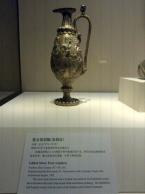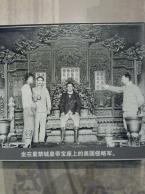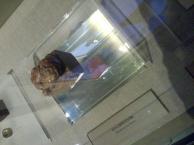Profile
Blog
Photos
Videos
Well so much for posting regular, short updates! It's getting more and more difficult to find things to write about as I get more and more used to life in Beijing - the entry-level odd stuff that I kept noticing in the first few weeks now seems entirely normal, and like a junkie who needs to take more and more of his drug of choice to get a fix, there's not a huge amount (of what I see day-to-day) that causes me to even raise an eyebrow. That said, I did see something today that I thought was quite funny.
First, some context. Most bikes in China, electric- or foot-powered, have an extra seat over the back wheel, and you see male students giving their female friends a ride, or parents and grandparents with a child on the back seat, pretty much every day. Two men or women riding on the same bike is nothing out of the ordinary either. What I saw today though, as I was cycling back from a second-hand book market that gets held every weekend on campus, was two policemen/campus security (it's unclear where one ends and the other begins) sharing a bike. Admittedly, most policemen in China look around 17 and wear trainers whilst in uniform, so this didn't exactly shatter an otherwise intimidating image(1), but what really made me notice them was that the guy in front had his feet up and his friend was leaning back, stretching his legs out in front so that he could pedal. I was heading in the other direction so only saw them for a few seconds, but the sight of them had such a Butch-and-Sundance vibe that it's rather stuck with me.
On a related note (I promise), I recently went to a dinner in a nearby Korean restaurant at which the general manager of a company specialising in tours to North Korea had arranged to give a speech to a group of around 40 people. I'll not go into the details of what he said, mainly because I can't remember most of it - the soju (a Korean spirit that has very little taste, like vodka, but is only around half as alcoholic, meaning you can drink around three times as much of it) was flowing very freely. Still, it was interesting to hear about a country I'd always imagined as being a pantomime hell-on-earth where the sky's always grey, everyone's either in the army or a military prison and there's never any food, from the perspective of someone who's actually been there (over 100 times, as it happens). Obviously, that image isn't entirely inaccurate because they do have the largest armed forces per capita in the world and entire generations of families do get put into labour/torture camps for political 'crimes' and suffering indignities that, if Amnesty International is to be believed, are serious contenders with Auschwitz and Unit 731 for the title of 'worst example of the otherwise unimaginable evil which humans can be made to inflict upon one another'.
On the other hand, it's inhabited by 24 million people, not 24 million brainwashed automatons incapable of any thoughts beyond nuking Seoul. They have farms, factories and businesses like anywhere else, they get drunk, fall in love and tell dirty jokes (not necessarily in that order), and everyone (not just the elites) buys chocolate, mobile phones and (probably) condoms on the black market(2). Although it's the closest thing the real world has to Orwell's Airstrip One, it's not the land of unending military parades and nuclear brinkmanship that we often assume it is. All that stuff does happen, but because those are the only newsworthy stories, it's all you hear and see whenever the country gets mentioned in the news, so one assumes that that's what the whole country's always like. Not because of brainwashing by capitalist propaganda, but because media outlets only have so much time to devote to this odd little leftover from the Cold War or else people lose interest - 'Many farmers living basically normal lives' isn't the sort of title that wins Pulitzers.
Now, how is that related to two young security guards messing around whilst sharing a bike? Well, I've noticed that lots of people back home seem to think about China in the same terms I do about North Korea. [SPOILER: this is quite a lengthy bit about macroeconomics written by a complete amateur. If that doesn't sound like your cup of tea, just go and watch the South Park episode where the Beijing Olympics convinces Cartman that China wants to take over the US. I won't be offended] Thanks to the absurd economic growth China's enjoying whilst we in the West flounder around in the doldrums, and the fact that, lets face it, Chinese people all look fairly similar to the eyes of Westerners who rarely see them outside of late-night takeaways, crowd shots in documentaries about China's economy and a few very clichéd, racially stereotyped roles in TV and film (because yellow is the new black), there's undoubtedly a perception in the UK and the States that Red China (everyone's caps) is some sort of homogenous sleeping dragon(3) made out of people. Finally, the story goes, the dragon is waking up and before long will subjugate the world in the way that western European nations did when they were the rising global powers.
Not to start accusing people of orientalism (partly because I'm in a glass house and that's a rather large stone, and partly because that might lead people to look it up, and as far as Edward Said's work is concerned, ignorance is bliss), but that view of things is essentially b******s. True, there are 1.3 billion people in China, but in the West we tend to fixate on the figure of 1.3 billion rather than the important word, which (if you'll forgive me for sounding like some kind of hippie for a moment) is 'people'. People who 90% or more of the time care far more about gossip than politics, prefer getting drunk to attending political rallies or subversive underground meetings on the odd evening where they've got the free time, and would far rather send their children to foreign universities than troops to foreign shores. It's easy to get scared by phrases like 'double-digit growth', but hopefully it won't come as a surprise to hear that China hasn't found some magical cheat code that allows them to break the fundamental laws of economics and 'beat' 'us' at 'our own' 'game'(4). In fact, China's GDP growth has started to drop fairly quickly in recent years.
Admittedly, the most recent figure of 7.5% is still the sort of thing Europe drools over, but it's a sign that the export-led good times are drawing to an end, and the economy needs rebalancing to continue growing. As incomes have risen, manufacturing workers are demanding and earning more money, so goods cost more to manufacture, and are therefore less competitive as exports, so an economy that's used cheap exports (for which you need cheap labour) to grow begins to slow down. This is such a common phenomenon it has its own name - the 'middle-income trap'. And as impressive as China's GDP growth figures have undoubtedly been, it's important to remember the basic fact that annual growth numbers are in proportion to the previous year, and that per-capita GDP is still barely above US$6,000 (see https://xkcd.com/1102/). This is a nation where tens if not hundreds of thousands of people are buying their first car every day, and countless more look at them with envy.
The idea that China 'owns' the West because it buys up so many US Treasury bonds, as if a descendant of the dastardly Fu Manchu's running Chinese economic policy, feeding America's 'habit' in order to weaken the country and leave it vulnerable to predation, sort of like China accused Britain of doing with opium in the 19th century, is a fallacy born of the urge to see problems at home as the result of perfidious external forces rather than internal weaknesses. In the modern case, it's a fallacy that gets fed by a fundamental misunderstanding of how debt works when both creditor and debtor are countries with their own central banks. I don't fully understand it, but I believe the way it works is that by buying so many US bonds, China keeps the value of the yuan artificially low compared with other currencies.
This happens because there are more yuan in circulation, so each individual yuan is less valuable. Therefore, Chinese exports stay cheap (because the companies making the products denominate prices in yuan), or at least don't rise in price as quickly as they would if left to the 'invisible hand' of the free market. If it stopped doing this, or 'recalled' its debt (which I'm not entirely sure you can even do with bonds), it would suddenly find it more difficult to export anywhere AND kick its largest export market where it hurts just as it begins to recover. Needless to say, this would be terrible news for every Chinese business which depends on exports, which is a lot of them, as well as all of the ones which depend to some extent on those businesses, which is probably most of the rest. Long story short, the White House isn't going to be repossessed by 'the Chinese' anytime soon.
The other 'scary' aspect of China is, of course, the fact that it's run by the Communist Party. I've mentioned in previous posts how far removed today's China is from the Maoism of 1949-79, because I like to state obvious facts as if they're my own opinions. There's no doubt it's still an autocratic regime, but to extrapolate from this the idea that China is some kind of collectively organised society, controlled by the government and directed towards the sort of nefarious ends that only Communists can have, as many seem to, is nonsense.The short answer to why it's nonsense is "paranoia". The medium-length answer is that autocracy is not the same as totalitarianism, but that this fact seems to be glossed over by a depressingly high amount of Western coverage of China, even by fairly well-respected journalists(5), for exactly the same reasons as all you see of North Korea (which IS still totalitarian) is military parades and Kim Jong-Un pointing at weapons. Unsurprisingly, this produces exactly the same one-dimensional perceptions in the minds of those who have little to no firsthand experience with these countries or their people. The long answer could probably fill several volumes of a book, so don't expect it here.
Having by now spent 3 and a half months in China I'm by no means an expert, and perhaps I'm guilty of wilfully ignoring the bad stuff that does go on because, as a white person with money who studies at the country's best university, I live essentially a charmed life here. On the other hand, I think I've got a decent taste for an outsider of what life in China is 'really' like on the day-to-day level for at least some people. While most of the Chinese friends with whom my conversations have touched on politics seem to be happy with the government and the way things are going in general, in a way that might seem bizarre coming from a Brit or American, I certainly don't get the impression that this comes from brainwashing, or fear of the consequences of 'speaking out'. I'm going to use a few examples to illustrate this:
- I met up with my language partner last weekend for hotpot, and eventually we started chatting about the recent set of reforms announced by the big Party meeting that happened in October. He seemed to think it'll be as significant for China's political development as Deng Xiaoping's reforms were for its economic development - re-education through labour has been abolished, the one-child policy has been significantly relaxed, and apparently the distinction between Party and government is now slightly clearer (on paper at least). Maybe slightly optimistic, but he does strike me as something of a liberal. He then started asking me about whether I can still cast my vote in the UK as an expatriate, so I decided to ask him what he thought about voting in China. His response was that although he hopes to one day be allowed to vote, for now he feels like he has all the freedoms he needs, including free speech "as long as I don't say anything to make the government scared of me". Maybe I'm reading too much into his choice of words since he was speaking in English, but I did think it interesting that he said 'scared of', as opposed to, say 'notice'.
- One of my teachers who was a student during the Cultural Revolution told us during class about her experience of being sent to a peasant village to work (not a punishment as such - it was official policy to send 'educated youth' away from the cities to 'learn from the peasants'). For those who don't know, the Cultural Revolution was the period when the cult of Mao was at its height, and China got caught up in an ultra-leftist frenzy of smashing up anything that was 'old' or 'bourgeois' and deciding that red should mean 'go' at traffic lights. It was basically a time when China was not unlike North Korea is now, except the moderates eventually won out. Anyway, what this teacher said was that basically she had a pretty good time, except that she and her friends were too busy with work to study. The one real problem was that "there was a risk that the male students would behave badly, so we got some money from the government and built a separate women's dormitory."
I suppose going out to the country with all (or most of) your friends for a few months wasn't exactly the worst thing that could happen to someone, especially not during that period. Now, I'm not saying that the damage (mainland) China did to its own culture wasn't horrific and lasting, or that the breakdown of the state in favour of allowing groups of angry teenagers to 'promote revolution' by beating up their teachers wasn't a terrible, terrible idea. There's also the possibility that the teacher chose not to tell us about bad experiences (or won't admit them to herself) or that she looks back at that time with nostalgia simply because it was during her youth. That's not to say that for a lot of people (particularly the people who were young enough then to still be mostly alive today), my teacher's experience may not have been entirely unrepresentative.
- Another teacher was telling us how she likes to travel and the places she's visited, and eventually we got on to Tibet (it's tricky for foreigners to get into ever since 2008, but Chinese people have no problem - the government's actually doing everything it can to get people to settle there, because it turns out colonialism isn't just something white people do). We didn't talk about politics per se, but we did discuss how Tibet was developing and becoming much more like any other Chinese city, with all that implied about Tibetan culture. Her view of things was "yes, it's sad that traditional culture suffers, but who are we as tourists to tell Tibetans that they can't have electric lights and indoor toilets?" Now quite frankly I don't want to touch the issue of Tibet (aka "the baby seals of human rights", as a delightfully irreverent American friend of mine described it) with a ten-foot pole, but there's an extent to which she has a point.
Anyway, nearly 3,000 words later (if only I could pass off stream-of-consciousness ramblings as academic essays) I can talk about the things I've been up to recently. It boils down to 'not a lot'; this ankle of mine has kept me from doing any kind of sport or exercise for exactly one month now, and it's starting to drive me crazy. Given that I'm still in love with the salty, oily, batter-y delights of Chinese street food, this lack of activity isn't doing me any favours in terms of how I look with my shirt off either. It has at least given me time to get academic work done, although that just reminds me how terrible I still feel my Chinese is, and focus on tutoring to earn some money (expect a slew of photos in about a month's time when I'm finally on holiday and going to new and interesting places).
Oh, I did go to the Old Summer Palace a little while ago on a whim. Before my birthday in fact. Wow, it has been a while since I posted. Anyway, it was a sunny day, I had no classes that afternoon and it's directly north of the university, so it was a quick walk away. First, some background: the palace was built mid-way through the Qing dynasty, made up of as many as 40 different mini-palaces surrounded by scenery that was shaped to resemble various famous landscapes from across the empire. In one corner was added a folly built to emulate the architectural styles of the western barbarians with their funny clothes and mechanical curiosities - namely a mock Versailles. At the end of the second Opium War (1862), the British (with our newfound friends, the French) decided to make it quite unmistakeable that they had absolutely won by marching on Beijing and forcing terms (which didn't happen after the first war). When they arrived the royal family had unsurprisingly fled, so it was decided to ransack the summer palace as a physical reminder of the victory. It burned for four days.
All that's left these days is some refilled ornamental lakes, signs telling you where various pavilions once stood, and some of the European section along with depressingly tantalising sketches of its heyday. Having been there and seen all that's left of what was once a truly magnificent complex, I understand why classicists (and Greeks) get so annoyed by the Elgin marbles. Weirdly, the destruction of the Summer Palace was supervised on the British side by none other than the Earl of Elgin. I'm not sure if it was the same one, but I'm also not sure whether it'd be better that all this thievery and destruction were the work of one aristocratic cad or if a whole dynasty of them were in on it. The sting in the tail of this story, however, is the new summer palace, built a kilometre or so away and nowhere near as pretty in my opinion. There's a photo of a marble boat in the album of pictures I took in the old palace, and I mentioned there's another, bigger one in the new one.
The new marble boat, in a perfect illustration of the farce that was the late Qing dynasty, was built somewhat later for the pleasure of Empress Dowager Cixi (who essentially ruled China at the time, the emperors regnant being easily-dominated boys with no or little political base of their own) using money that had been siphoned off from foreign loans given for the modernisation of the navy. Just to make it crystal clear: China, defeated twice by the superior navies of foreign powers and the royal summer palace burnt to the ground, took money lent by those foreign powers for the purpose of improving its own navy and spent it on a pleasure boat made out of solid marble (so not really a boat at all) for the new, bigger, uglier royal palace. This is just one particularly bad example of how Cixi ruled China into the ground. There aren't a huge number of historical figures about whose actions its difficult to point to a single good consequence, but I think she's definitely one of them, given how bad a time China had as a result of the Qing empire's refusal to modernise.
On a lighter note, it's getting close to Christmas! It's weird that I actually have to remind myself of that; beyond the occasional Christmas song being played in a shop, outside my flat there's almost no reminder that 'tis the season. The day itself is also, according to Peking University, a normal day like any other, so we have classes(6) and the term, which began in September, doesn't even end until after New Year! This may soon change though: Chairman Mao was born on the 26th of December, and as this year is the 120th anniversary of that special day there's a campaign to make that anniversary a public holiday(7). Given that his policies resulted in the greatest manmade famine in history, I'd love to hear what a Maoist Christmas dinner would involve. Fortunately I have an advent calendar and a plastic LED-lit mini Christmas tree in my room, so there is a certain amount of bourgeois cheer to be had.
I doubt I'll update this blog again before Christmas, which means I'm unlikely to do so whilst travelling either, so if there's anyone reading this outside of my friends and family, 聖誕節快樂,新年萬事如意!
1. A notable exception being the types who go around in dark green vans wearing body armour and carrying shotguns, who only ever seem to show up and banks and transfer money around. Either the Chinese equivalent of G4S takes its job VERY seriously, or some enterprising thieves have hit upon the best possible disguise.
2. North Korea was recently ranked the joint-most corrupt country in the world. However, given the nature of the North Korean state, what over there is considered 'corruption' and counted as such by whichever NGO published the report is nothing more than what we would consider commerce. 2 million mobile phones were sold there last year, at an average price of US$150 each. The mean monthly wage by official statistics is US$8. It doesn't take a genius to work out that the black market, or 'market', is a colossal part of the North Korean economy, and not just because of Kim the Third's brandy collection.
3. Because of course it's a dragon, never mind that the Chinese dragon is actually a benevolent animal that brings rain.
4. That mass of inverted commas is used because the only part of that phrase I don't feel needs to be discretely marked as sarcastic (as opposed to discreetly marked, which would entirely defeat the point) is the preposition. And that's only because I'm not sure how a preposition can be used sarcastically.
5. Which is one of the reasons why I'm so in love with Sinostand. Read http://sinostand.com/2013/04/04/unquestionable-truths/, http://sinostand.com/2013/04/19/the-non-negotiable-ps/ and http://sinostand.com/2013/11/26/on-xia-yeliang/, ideally in that order if you want a slightly more nuanced view of how the government works in China.
6. In classic Chinese style, despite Cambridge's insistence that we go to classes on the 25th in the name of cultural immersion, our teachers are well aware that we're unlikely to go into class, and have agreed to just email us that day's work. In a way, that in itself is an authentic cultural experience, so thanks for that Cambridge!
- comments











mum fascinating read againTom :)